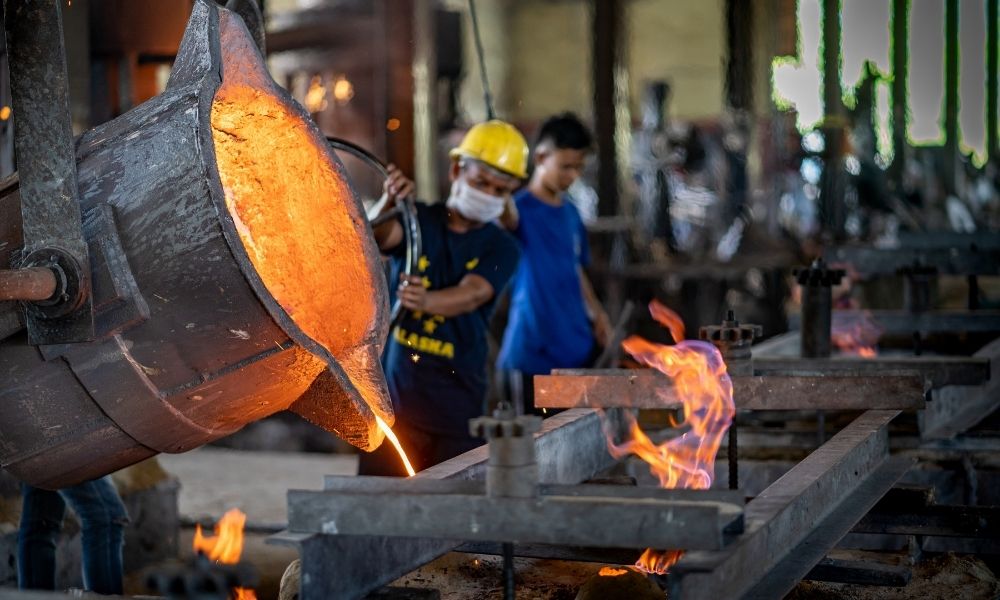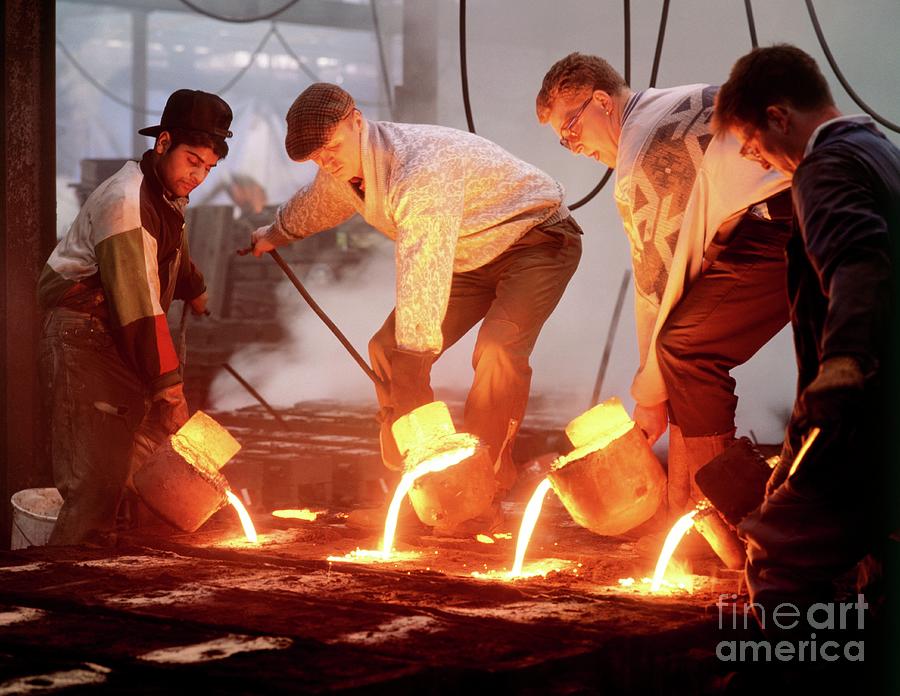Unveiling the Role of Metal Foundry in Construction Manufacturing
Wiki Article
A Comprehensive Guide to Metal Casting: Benefits and Providers Provided by Foundries
Metal casting is a critical procedure in numerous sectors, supplying many advantages with the services of shops. These centers transform molten metal right into durable and exact parts, satisfying certain client requirements. By employing advanced innovations, factories assure top quality and effectiveness in manufacturing. Nevertheless, the ins and outs of metal casting and the diverse methods involved increase crucial inquiries regarding its role in contemporary production. What advancements exist in advance in this important field?Recognizing the Metal Casting Process
The metal casting process is a fundamental method used in producing to produce complicated shapes and components. This technique includes pouring molten metal right into a mold and mildew made to create the preferred things. The procedure starts with pattern development, which offers as a theme for the mold. Aluminum Casting. Numerous products, such as sand, metal, or ceramic, are utilized for mold-making, depending upon the details needs of the casting
As soon as the mold and mildew is prepared, molten metal is put right into it and permitted to cool down and solidify. After solidification, the mold is removed, disclosing the actors part. Various strategies, including sand casting, investment casting, and pass away casting, are used, each fit to different applications and products. Quality control measures, such as inspections and screening, are vital to guarantee the end product satisfies specifications. On the whole, the metal casting procedure plays an essential duty in creating parts for markets varying from automobile to aerospace.
Trick Perks of Metal Casting
Metal casting offers substantial advantages that make it a favored manufacturing approach in various markets. Its layout flexibility and accuracy permit detailed shapes, while cost-efficient automation boosts efficiency. In addition, the flexibility and toughness of materials utilized in casting add to the toughness of the end products.Layout Flexibility and Accuracy
Launching amazing layout flexibility and precision, metal casting permits developers and designers to create complex forms and features that would be impossible or challenging to accomplish with various other manufacturing methods. This ability makes it possible for the production of complicated geometries, interior frameworks, and great details that enhance product performance and visual appeals. Furthermore, various casting methods, such as sand casting, financial investment casting, and pass away casting, give further options for personalization, suiting varied product residential properties and project requirements. The adaptability of molds permits modifications during the design phase, improving the shift from idea to final product. Eventually, metal casting sticks out for its capability to provide high-precision elements, making it a very useful procedure in sectors varying from vehicle to aerospace and past.Economical Mass Manufacturing
Economical automation stands as one of the main advantages of metal casting, enabling manufacturers to generate huge amounts of parts at a reduced expense per system. This efficiency arises from the capacity to develop complex molds that can be reused multiple times, substantially minimizing setup and operational costs. In addition, metal casting processes, such as sand casting and pass away casting, allow for high throughput, making it possible to satisfy the demands of large-scale manufacturing runs. The minimized material waste and power usage additionally boost cost financial savings, making metal casting an eye-catching choice for industries requiring bulk parts. Generally, the affordable nature of metal casting settings it as a favored method for manufacturers going for economic effectiveness in their production procedures.Material Convenience and Stamina
One of the standout features of metal casting is its amazing product flexibility, which enables making use of a variety of alloys and metals. This flexibility makes it possible for producers to pick materials that finest match their particular applications, from light weight aluminum and bronze to iron and steel. Each metal provides one-of-a-kind residential or commercial properties, consisting of differing degrees of stamina, deterioration resistance, and thermal conductivity. Metal casting can generate parts that meet rigid efficiency requirements across diverse markets, such as auto, aerospace, and construction. Furthermore, the toughness of actors metals can be improved with different therapy procedures, ensuring toughness and longevity. Aluminum Casting. Overall, the combination of material flexibility and intrinsic toughness makes metal casting a recommended selection for producing high-grade componentsKinds of Metal Casting Techniques
Metal casting encompasses a variety of methods that deal with different manufacturing needs and material residential properties. Usual approaches consist of sand casting, which uses a sand mold for complex shapes, and investment casting, understood for its precision and surface coating. Pass away casting is one more method that employs high-pressure shot of liquified metal right into molds, perfect for mass manufacturing of small components.Covering molding uses a quicker alternate, using a resin-coated sand to develop thin-walled molds, while shed foam casting enables elaborate designs without the demand for a core.
In addition, constant casting is utilized for generating lengthy sections of metal, such as sheets or bars, by strengthening molten metal in a continuous process. Each technique provides special benefits and is chosen based upon variables like the called for information, manufacturing volume, and product type, ensuring remarkable outcomes in metal manufacture across numerous markets.
The Duty of Foundries in Metal Casting
Factories play a critical role in the metal casting procedure, working as the facilities where liquified metal is transformed right into finished items. These specialized establishments are outfitted with the required tools and modern technologies to deal with numerous metals, making certain top notch outcomes. Factories are responsible for a number of crucial features, consisting of melting the metal, pouring it right into molds, you can try this out and enabling it to strengthen.Additionally, they preserve rigorous safety and environmental requirements to protect workers and lessen ecological impact. Knowledgeable specialists and designers team up to optimize casting processes, improving effectiveness and decreasing waste. Shops likewise take part in high quality control steps, making certain that the end products satisfy specific tolerances and specs. This top quality guarantee is essential for industries that rely upon exact elements, such as auto and aerospace. Consequently, shops add substantially to the total production landscape, making it possible for innovation and growth across various industries.
Customized Metal Casting Solutions
Customized metal casting solutions offer tailored layout solutions that fulfill details customer needs. These solutions likewise offer material choice proficiency, ensuring the ideal metal is selected for the wanted application. Such flexibility and knowledge enhance the general top quality and efficiency of the end product.
Customized Design Solutions
Tailored layout options in metal casting provide makers with the flexibility to produce parts that meet certain performance and aesthetic needs. Factories supply customized solutions that permit clients to define measurements, shapes, and surface area finishes to accomplish wanted outcomes. This modification procedure typically consists of cooperation between developers and designers, ensuring that the final items straighten with operational needs and market criteria. Advanced modern technologies, such as computer-aided design (CAD) and simulation software application, make it possible for specific modeling and screening of components before production, decreasing mistakes and enhancing effectiveness. By leveraging customized layout remedies, services can maximize capability while lowering waste and prices, ultimately leading to a more Extra resources one-upmanship on the market. This versatility is necessary for sectors calling for one-of-a-kind applications and requirements.Product Option Proficiency
When selecting materials for metal casting, proficiency plays an important role in guaranteeing that the right choice straightens with both efficiency demands and cost-effectiveness. Factories employ experienced professionals who recognize the residential or commercial properties of various steels and alloys, permitting them to suggest optimal materials for particular applications. Elements such as strength, deterioration resistance, and thermal conductivity are very carefully thought about to meet the customer's requirements. Additionally, sector patterns and innovations in product science notify these choices, allowing foundries to remain competitive. By leveraging their proficiency, shops can help clients in guiding via complicated material choices, ultimately bring about enhanced item high quality and reduced manufacturing costs. This specific knowledge is crucial for achieving effective outcomes in personalized metal casting services.Quality Assurance in Metal Casting
Quality control in metal casting is critical to guarantee that the end products satisfy the required specs and efficiency standards. Shops employ a range of techniques and techniques to guarantee the finest of actors components. This procedure begins with rigid product evaluations, validating that raw materials adhere to sector criteria. Throughout the casting process, real-time surveillance and screening are carried out to analyze parameters such as temperature, mold and mildew integrity, and dimensional precision.
Applications of Metal Castings Throughout Industries
Metal castings play a critical function in different industries, working as the backbone for numerous applications. In the automotive industry, cast components such as engine blocks and transmission real estates are needed for car performance and integrity. The aerospace industry counts on precision castings for crucial components that assure safety and security and performance in flight. Furthermore, the building market utilizes metal spreadings for fixtures, installations, and architectural components, enhancing the sturdiness of buildings and facilities.Additionally, the energy sector gain from castings used in turbine blades and various other tools crucial for power generation - Metal Casting. The clinical area additionally uses metal castings in tools and gadgets, showing the flexibility of this manufacturing process. In general, metal castings are important to the capability and development of varied industries, showcasing their relevance in contemporary technology and framework development
Frequently Asked Questions
What Materials Are Frequently Made Use Of in Metal Casting?
Usual products used in metal casting consist of aluminum, iron, bronze, steel, and brass. Each product offers one-of-a-kind residential properties appropriate for you could check here different applications, allowing producers to choose the most effective alternative based upon weight, rust, and stamina resistance.The length of time Does the Metal Casting Refine Typically Take?
The metal casting procedure normally takes a number of hours to a few days, relying on variables such as the intricacy of the style, kind of metal utilized, and the certain casting technique employed by the shop.
What Is the Ecological Influence of Metal Casting?
The ecological influence of metal casting includes energy consumption, discharges, and waste generation. Factories usually implement steps to alleviate these impacts, such as reusing materials and using cleaner technologies to reduce their eco-friendly impact.Can Metal Casting Be Provided For Small-Scale Projects?
Metal casting can without a doubt be done for small-scale projects. Different foundries accommodate such requirements, using tailored remedies that suit restricted production runs while preserving high quality and precision in the end products.What Are the Safety And Security Procedures in Metal Casting Foundries?
In metal casting shops, safety and security procedures consist of personal protective tools, proper air flow, training on devices usage, emergency situation treatments, normal maintenance checks, and adherence to industry safety requirements to minimize risks related to liquified metal and unsafe products.Furthermore, metal casting procedures, such as sand casting and die casting, permit for high throughput, making it viable to fulfill the needs of large-scale manufacturing runs. One of the standout features of metal casting is its exceptional product convenience, which permits for the use of a vast range of alloys and metals. Additionally, constant casting is utilized for producing long areas of metal, such as bars or sheets, by strengthening liquified metal in a constant process. Factories play a critical role in the metal casting procedure, serving as the centers where molten metal is transformed into finished items. Common products utilized in metal casting consist of aluminum, iron, steel, bronze, and brass.
Report this wiki page